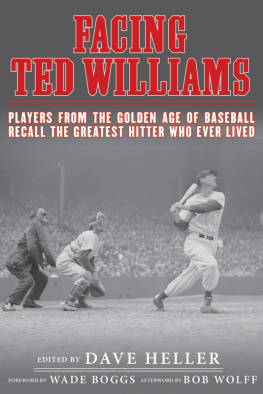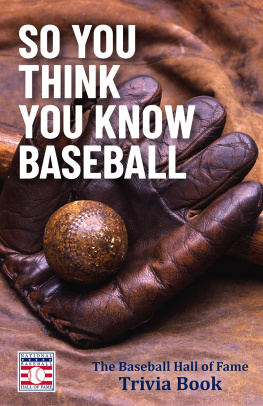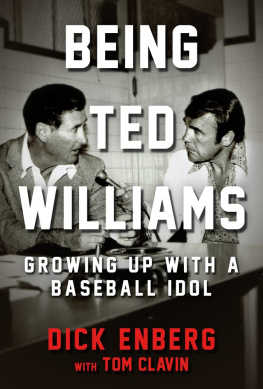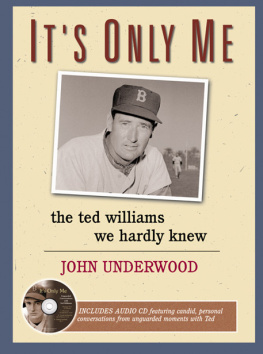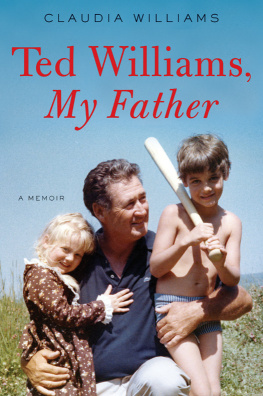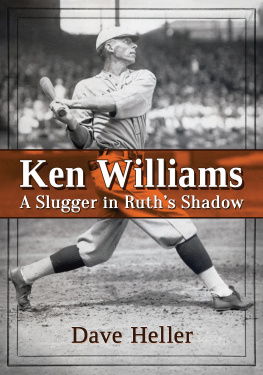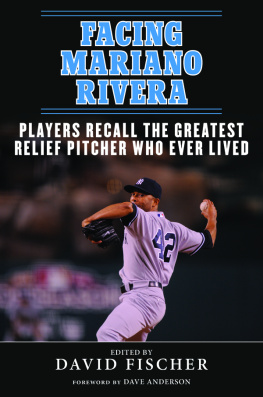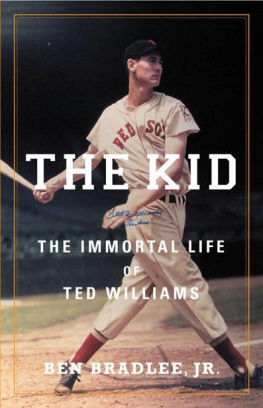FACING TED WILLIAMS
FACING
TED WILLIAMS
PLAYERS FROM THE GOLDEN AGE OF BASEBALL
RECALL THE GREATEST HITTER WHO EVER LIVED
EDITED BY DAVE HELLER
FOREWORD BY WADE BOGGS
AFTERWORD BY BOB WOLFF

Copyright 2013 by Dave Heller
Foreword copyright 2013 by Wade Boggs
Afterword copyright 2013 by Bob Wolff
All Rights Reserved. No part of this book may be reproduced in any manner without the express written consent of the publisher, except in the case of brief excerpts in critical reviews or articles. All inquiries should be addressed to Sports Publishing, 307 West 36th Street, 11th Floor, New York, NY 10018.
Sports Publishing books may be purchased in bulk at special discounts for sales promotion, corporate gifts, fund-raising, or educational purposes. Special editions can also be created to specifications. For details, contact the Special Sales Department, Sports Publishing, 307 West 36th Street, 11th Floor, New York, NY 10018 or sportspubbooks@skyhorsepublishing.com.
Sports Publishing is a registered trademark of Skyhorse Publishing, Inc. , a Delaware corporation.
Visit our website at www.sportspubbooks.com
10 9 8 7 6 5 4 3 2 1
Library of Congress Cataloging-in-Publication Data
Facing Ted Williams : players from the golden age of baseball recall the greatest hitter who ever lived / edited by Dave Heller ; foreword by Wade Boggs ; afterword by Bob Wolff.
pages cm
ISBN 978-1-61321-337-7 (hardcover : alk. paper) 1. Williams, Ted, 1918-2002 Anecdotes. 2. Williams, Ted, 1918-2002 Friends and associates. 3. Baseball players United States Biography. I. Heller, David Alan.
GV865.W5F33 2013
796.357092 dc23
2012048683
Printed in the United States of America
For my wife, Shelly. When she walks down the street, they should say, There goes the best damn wife there ever was.
Contents
T ed Williams is w ho John Wayne wanted to be when he grew up.
Growing up, I was a huge Ted Williams fan, and I mean huge . Coincidentally, I was drafted by the Red Sox in 1976. I wore No. 9 in high school and read The Science of Hitting my junior year. I never thought in my wildest dreams that Id actually have the opportunity of meeting him.
Well, it did happen. The first time I met Ted was when I was starting out in the minors. It was my first spring training. Im eighteen years old and standing in line at the movie theater two days into spring training, and standing two people behind me is bigger than life Ted Williams. I went up to Ted and introduced myself, said I was drafted the year before and played in Elmira, and grew up admiring him as a hitter.
And he just went into this conversation about how do you hold your hands, how do you do all of thisright in line. Just firing off this and that, what kind of hitter was I in high school, and I thought I had just died and went to heaven. It was truly one of those monumental experiences that you are afforded in life, and for me, having had the opportunity to meet Ted, it was truly overwhelming.
So, I can imagine how these young pitchers felt when they got the opportunity to face Ted Williams. It had to be mind-blowing. And now I can see why Ted Williams walked so muchbecause guys were scared to pitch to him!
He was a John Wayne-esque figure; very intimidating, very brash. It was pretty much an R-rated conversation every time Ted would get going; definitely wasnt for Little Leaguers. But this is the way Ted carried himself. He had that aura about himself that very few people carry.
You knew right when he walked in the room, like in that old commercial: If E. F. Hutton is talking, you listen. Every time Ted would say something, the whole room would get quiet. That was the intimidating part about him. When you are young and impressionable, he really stands out. That was the great part about Ted.
During my minor league days, Ted would just sort of be roving around in a golf cart. Hed stop by maybe once during the day while I was in Double-A or Triple-A, and hed stand behind the batting cage while guys were swinging and talk to various players. It was more of casual conversation than sit down and instruct.
What did you do in the game yesterday, kid?
Two-for-three, Ted, with a walk.
Where were your hits?
Line drive left-center base hit, ground ball in the hole for a base hit, grounder to short.
You didnt pull the ball?
Just certain conversations like that, rather than sitting down in the cage and doing it that way.
When I was in Triple-A, he said you have to get that 20, 21 pitch, and you just have to get those hips going and get those hands out in front. And that really wasnt my style. I stayed inside the ball and hit it the other way. I felt like when I did that, I rolled over a lot to second base and hit weak ground balls. I didnt have a good concept on how to pull the ball.
I sort of stuck to my guns, but its tough when youre listening to the greatest hitter that ever lived, and hes telling you to do one thing, and then youre doing your own thing. It wasnt a thing of going against Ted Williams. Everyone has their own mechanical philosophy, and for me to try to change, I think that would have destroyed my whole swing.
I thought I was better utilized in Fenway Park if I could reach the wall rather than hit deep fly balls to right field for outs. It just didnt compute in my brain to where that made sense, and leaving the wall to didnt make sense.
But later on, Ted did say, you get that 20, 21 pitch, look for that pitch to drive. And I really did that. I hit the ball to left-center and it would be high off the wall. In Wrigley Field, thats a home run. In Houston, thats a home run. And parks that didnt have the big 37-foot monster, you had the chance to hit the ball out of the park. It probably took some homers away, but it also gave you some hits. You could hit high fly balls to left field and then scrape the wall, which were outs in other parks.
Probably about 98 percent of the time I took the first pitch. There were instances when Id jump on the first pitch and felt comfortable doing so, but I feltanother chapter out of Tedthat the longer you faced a guy, the more chances he was going to make a mistake. The more pitches I saw, I felt I had the upper hand, that the guy was going to make a mistake. He wasnt going to make that good pitch early in the count to get me out. If I had five, six, seven, or eight pitches, I had the upper hand. Its demoralizing for a pitcher to foul off a ball, foul off a ball, foul off a good pitch, and foul it off and not put it in play. He gets somewhat upset, makes a mistake, and thats when you capitalize on it.

He would show up about once a year when I was with Boston. The Red Sox never had an old-timers day, but Ted would make it a point to come up for a weekend series unannounced. He would just walk in. Hed be there for Friday, Saturday, and maybe a Sunday game, and then you wouldnt see him the rest of the year.
He always made sure to come over and find me, and then wed sit down in front of my locker and chat. I have great pictures of us sitting in front of my locker, looking bright-eyed and very astute, with Ted doing his hand gestures. Those are very fond memories.
The funny part about it was, when he would come over, hed never ever let any reporters eavesdrop on our conversation. Hed basically shoo them away and wed talk for fifteen to twenty minutes. All the reporters would come up after, and their first question was, Did you guys talk about hitting? In actuality, Ted and I would talk fifteen to twenty minutes on nothing but fishing. During those chats, we would never, ever, talk about hitting. It was kind of funny. Every time wed sit down, hed want to know what kind of fish I caught in the offseason, what kind of line I used, where I was fishing, and various things like that. Hitting never really came up. He would like to talk about hitting with other players and young guys, but the majority of the time when Ted and I got together, it was non-stop fishing.

